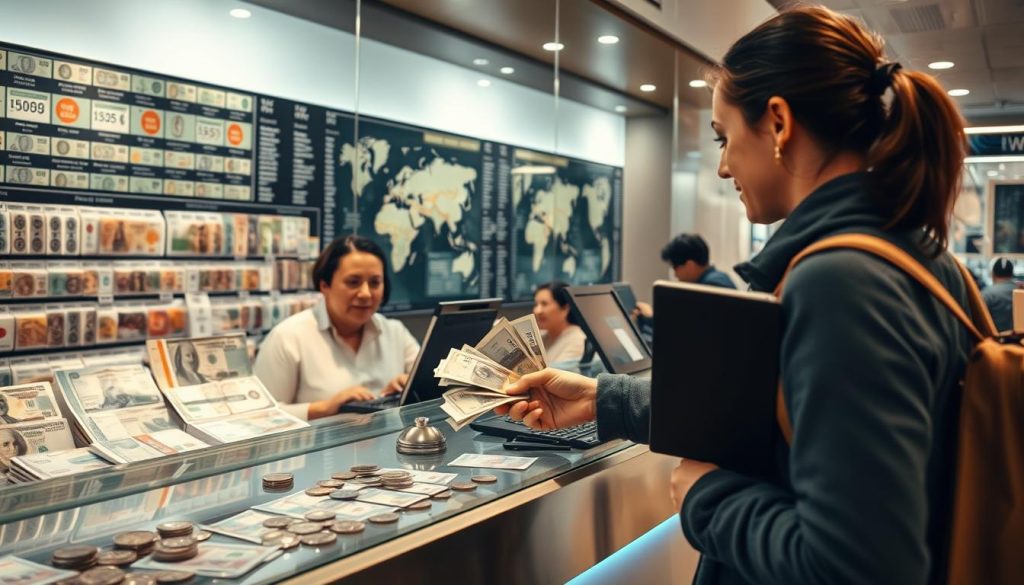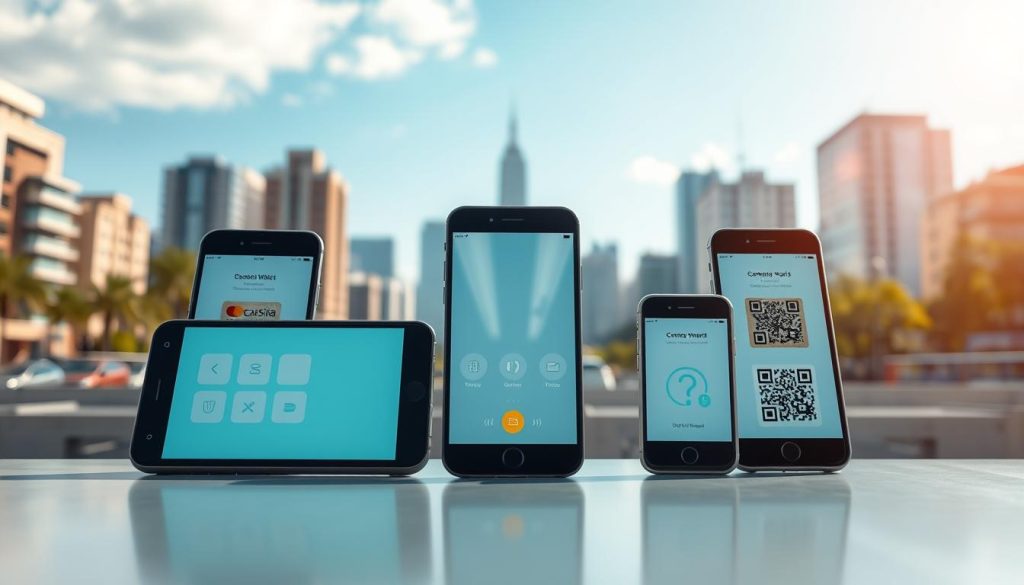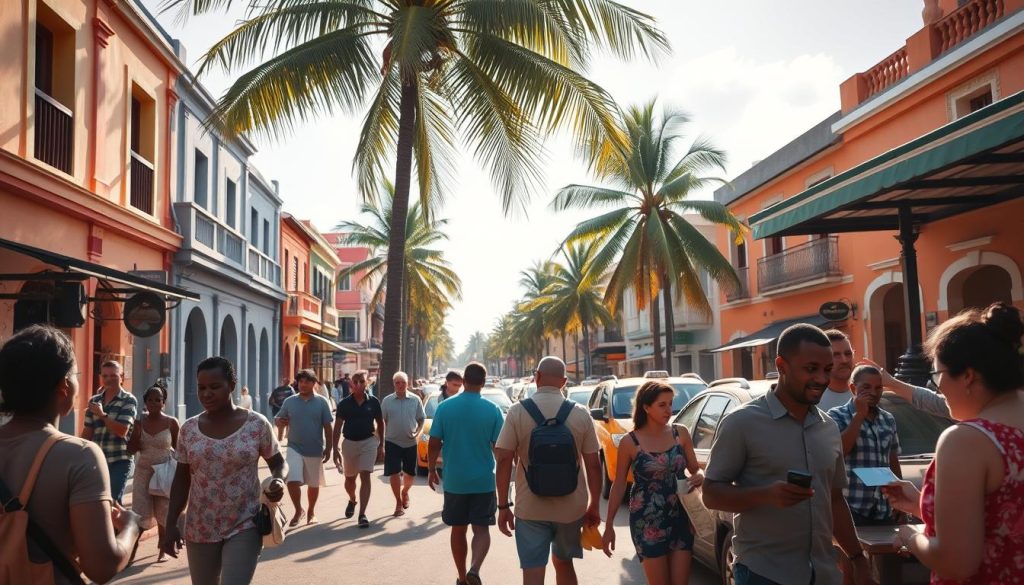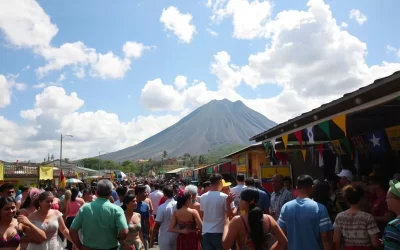✓ Accommodations✓ Flights✓ Rental Cars
Did you know that over 60% of travelers face challenges with currency exchange and payment methods abroad? Navigating finances in a new country can be tricky, but it doesn’t have to be. Montserrat, a hidden gem in the Caribbean, offers a unique blend of culture and evolving financial systems that make it a must-visit destination.
This guide is designed to help you manage your travel finances with ease. From securing the best exchange rates to understanding local bank services, we’ve got you covered. Whether you prefer using credit cards, ATMs, or cash, you’ll find practical tips to ensure a smooth arrival and hassle-free experience.
Planning ahead is key. Learn how to avoid high fees and explore the best options for your trip. With this guide, you’ll be well-prepared to enjoy everything Montserrat has to offer without worrying about your finances.
Introduction to Montserrat and Financial Essentials
Planning your finances for a trip to Montserrat? You’re in the right place. This guide will help you navigate the island’s financial landscape with ease. From understanding the local currency to finding the best banking services, we’ve got you covered.
Key Travel Finance Highlights
When traveling, managing your money efficiently is crucial. Here are some essential tips:
- Secure competitive exchange rates before your trip to avoid inflated costs at the airport.
- Use credit cards for convenience, but always carry some cash for smaller transactions.
- Research local banks and ATMs to ensure smooth access to funds.
Understanding Montserrat’s Economy
Montserrat, a British Overseas Territory, has a unique economic history. Its economy relies heavily on tourism, agriculture, and financial services. The Eastern Caribbean Dollar (EC$) is the official currency, pegged to the US dollar at a fixed rate of 2.70 EC$ to 1 USD.
Early planning is key to avoiding unexpected fees. By understanding the local economy, you can make informed decisions about your finances. This guide will provide detailed advice on banking, currency exchange, and more to ensure a hassle-free trip.
Whether you’re budgeting for daily activities or preparing for emergencies, this guide is your go-to resource for all financial aspects of your journey.
Accepted Currencies and Payment Methods in Montserrat
Understanding the local currency and payment options can make your trip smoother. The Eastern Caribbean Dollar (EC$) is the official currency, pegged to the US dollar at a fixed rate of 2.70 EC$ to 1 USD. This means you can easily calculate your expenses and budget effectively.

Eastern Caribbean Dollar Basics
The EC$ is widely used for daily transactions, from shopping to dining. U.S. dollars are also accepted in many places, but you’ll often receive change in EC$. It’s a good idea to carry some local cash for smaller purchases, especially in rural areas.
Knowing the fixed exchange rate helps you avoid confusion. For example, if you’re exchanging $100 USD, you’ll receive 270 EC$. This consistency makes it easier to plan your spending and avoid unexpected costs.
Currency Exchange Tips for Travelers
To get the best rates, compare options before your trip. Banks and local exchange bureaus often offer better rates than airports. Avoid exchanging large amounts at the airport, as fees can be high.
Using ATMs is a convenient way to withdraw EC$ directly. Check with your bank about international withdrawal fees to save money. Local shops and providers also offer competitive rates, so don’t hesitate to ask around.
By planning ahead and comparing rates, you can make informed decisions and enjoy your trip without financial stress.
Banking Solutions and ATM Convenience
Managing your money while traveling can be stress-free with the right tools and knowledge. Modern banking services and ATMs make accessing funds abroad simple and secure. Whether you’re withdrawing cash or using your credit card, planning ahead ensures a smooth experience.
Using Credit and Debit Cards Abroad
Using your card internationally is convenient, but it’s essential to take precautions. Notify your bank about your travel dates to avoid service interruptions. Many banks flag international transactions as suspicious, so this step is crucial.
Be mindful of foreign transaction fees, which can add up quickly. Some providers charge 1-2% per transaction. Look for cards with no international fees to save money. Always carry a backup card in case of emergencies.
ATMs are widely available and offer a reliable way to access local currency. Major ATMs in Montserrat reflect the mid-market exchange rate, ensuring fair rates. Check with your bank about withdrawal fees to avoid surprises.
For added security, use ATMs located inside banks or well-lit areas. Avoid standalone machines in secluded spots. Reputable banks and service providers ensure your transactions are safe and efficient.
Modern banking solutions provide nearly 24/7 access to funds, which is critical for emergencies. With a bit of planning, you can enjoy your trip without worrying about finances. Stay informed, and your financial interactions will be hassle-free.
Pre-Trip Financial Planning and Budgeting
Getting your finances in order before your trip is a game-changer. A well-thought-out budget ensures you can enjoy your journey without worrying about unexpected costs. Start by setting a clear financial plan that covers everything from flights to daily activities.

One of the first steps is securing the best exchange rates. Airport counters often charge higher fees, so it’s better to compare rates at local banks or online platforms. Early research can save you money and give you peace of mind.
How to Secure Competitive Exchange Rates
Start by contacting your bank or credit union well in advance. Many institutions offer competitive rates for larger sums but require time to process your request. Online currency exchange platforms are another great option, as they often provide better rates and convenient delivery options.
Track rate fluctuations using online tools. This allows you to exchange money when rates are most favorable. Avoid last-minute exchanges, as they often come with higher fees and less favorable terms.
Balancing Cash and Card-Based Funds
While cards are convenient, carrying some cash is essential for smaller purchases or places that don’t accept cards. A mix of both ensures flexibility and security. Notify your bank about your travel dates to avoid any issues with card access.
Planning ahead also helps you avoid hidden fees. Whether it’s ATM charges or foreign transaction fees, a well-prepared budget keeps these costs in check. With the right approach, you can start your trip with a stress-free financial foundation.
Payment Options at Hotels, Restaurants, and Shops
When exploring Montserrat, knowing your payment options can make your experience seamless. Major hotels and restaurants widely accept credit and debit cards for convenience. This ensures smooth transactions, especially for larger purchases or dining out.
However, smaller shops and local vendors may only accept cash. It’s a good idea to carry some local currency for these situations. This way, you won’t miss out on unique souvenirs or local treats.
Before making large purchases, check with the service provider about accepted payment types. Clear signage and staff familiarity with different options ensure hassle-free transactions. This preparation can save you time and avoid surprises.
Carrying a mix of payment methods is key. Whether you’re booking a tour, enjoying a meal, or shopping for gifts, having both cash and cards ensures you’re covered. This flexibility enhances your overall travel experience.
Understanding these payment options helps you navigate daily activities with ease. From your arrival to the end of your trip, being prepared ensures a stress-free and enjoyable journey.
Navigating Taxes, Fees, and Tipping Customs in Montserrat
Understanding local taxes and tipping customs can save you money and enhance your travel experience. Montserrat has its own financial nuances, and being aware of them ensures you stay within budget while respecting local practices.
Understanding Value Added Tax (IVA)
Montserrat applies a Value Added Tax (IVA) to most goods and services. This tax is typically included in the final price, so you won’t need to calculate it separately. However, it’s good to know that IVA can range between 10-15%, depending on the service or product.
When dining at a restaurant or booking a tour, always check if the IVA is included. Some providers may list prices without tax, which could increase your final cost. Asking for a detailed bill can help you avoid surprises.
Local Tipping Practices and Guidelines
Tipping is a common practice in Montserrat, especially in the hospitality industry. For good service, a tip of 10-15% is customary at restaurants. Some establishments may include a service charge, so check your bill before adding extra.
Here are some tipping guidelines to keep in mind:
- At hotels, tipping housekeeping staff $1-2 per day is appreciated.
- For taxi drivers, rounding up the fare or adding 10% is a polite gesture.
- Tour guides often expect $5-10 per person for a full-day activity.
Understanding these practices ensures you show appreciation without overspending. A little research on local customs can go a long way in making your trip smoother.
By being aware of taxes, fees, and tipping norms, you can manage your finances effectively. This knowledge not only helps you budget better but also ensures you respect local customs, enhancing your overall travel experience.
Safe and Convenient ATM and Bank Services
With 24/7 ATM access, managing your funds in Montserrat is both safe and convenient. The island’s modern banking infrastructure ensures you’re never far from financial support, whether you’re withdrawing cash or checking your balance.
ATMs are widely available in well-lit public areas and near banks, offering a secure way to access cash. Always check for tampering before using an ATM and shield your PIN during transactions. This simple step can prevent fraud and keep your funds safe.
Transaction fees at ATMs are competitive compared to exchange bureaus. However, it’s wise to monitor these fees, especially if you’re withdrawing frequently. Some banks offer fee-free withdrawals for international travelers, so check with your provider before your trip.
Stay aware of your surroundings, particularly at night. Use ATMs located inside banks or busy areas to minimize risks. Trusted banks like HSBC and Barclays provide reliable services, ensuring backup in case of an emergency.
Before using your card, confirm its acceptance at local ATMs and any associated costs. This avoids surprises and ensures smooth transactions. For added security, sign up for SMS alerts to monitor your account activity in real time.
By using secure and well-established bank networks, you can enjoy your trip without financial worries. Montserrat’s banking services are designed to support travelers, making it easy to focus on your destination.
Alternative Payment Methods and Emergency Funds
Digital payment platforms are transforming how travelers manage their finances abroad. These modern tools offer a secure and convenient way to handle transactions, making them an excellent alternative to traditional cash and card methods. Whether you’re dining at a restaurant or booking a hotel, digital payments can streamline your experience.

Why Choose Digital Payment Platforms?
Digital platforms like PayPal, Venmo, and Apple Pay are gaining popularity among international travelers. They provide faster transaction speeds and eliminate the need to carry large amounts of cash. Many of these services also offer competitive exchange rates, saving you money on fees.
However, it’s essential to compare the costs. Some platforms charge a small fee for international transactions. Always check the terms before using a new service to avoid surprises.
Setting Up an Emergency Fund
While digital payments are convenient, having a backup fund is crucial. Unforeseen circumstances, like a lost card or a delayed flight, can disrupt your plans. A digital emergency fund ensures you’re prepared for any situation.
Consider using a trusted service like Wise or Revolut for this purpose. These platforms allow you to store funds securely and access them instantly when needed. Pair this with travel insurance for added peace of mind.
Comparing Digital Payment Options
Here’s a quick comparison of popular digital payment platforms:
| Platform | Fees | Exchange Rate | Accessibility |
|---|---|---|---|
| PayPal | 2.9% + $0.30 | Mid-market | Widely accepted |
| Wise | 0.5% – 1% | Mid-market | Global |
| Revolut | No fee (up to limits) | Mid-market | Global |
By diversifying your payment methods, you increase both security and flexibility. Whether you’re withdrawing cash or using a credit card, having multiple options ensures a smooth and stress-free trip.
Montserrat: Ultimate Travelers Guide to Currencies & Payments
Navigating financial decisions while traveling can be tricky, but with the right advice, it becomes manageable. Whether you’re exchanging currency or using your card, a few expert tips can save you time and money. Let’s dive into practical strategies to make your trip smoother.
Mastering Currency Exchange
Getting the best exchange rate starts with research. Avoid airport bureaus, as they often charge higher fees. Instead, compare rates at local banks or online platforms. For example, exchanging $100 USD typically gives you 270 EC$ at the fixed rate of 2.70 EC$ to 1 USD.
Here’s a quick checklist for currency exchange:
- Check rates online before your trip.
- Use ATMs for fair rates and convenience.
- Carry some cash for smaller purchases in rural areas.
Minimizing Fees and Maximizing Value
Travel insurance can protect you from unexpected costs, but it’s also essential to minimize everyday fees. Notify your bank about your travel dates to avoid service interruptions. Look for credit cards with no foreign transaction fees to save on every purchase.
ATMs are a great option, but be mindful of withdrawal fees. Use machines located in secure areas, like inside banks, to ensure safety. Pair this with a backup card for emergencies.
Real-World Scenarios and Local Insights
Planning ahead can prevent financial stress. For instance, knowing that tipping 10-15% is customary at restaurants helps you budget better. Speaking with local providers can also offer valuable insights into the best shops and activities.
Here’s a tip: Always ask for a detailed bill to avoid hidden fees. This simple step ensures transparency and helps you stay within budget.
By following these expert tips, you can make informed financial decisions that enhance your travel experience. From managing currency to avoiding unnecessary fees, a little preparation goes a long way. Enjoy your trip with confidence, knowing your finances are in good shape.
Practical Payment Insights for Daily Expenses
Handling daily expenses while traveling doesn’t have to be stressful. With a few smart strategies, you can manage your budget effectively and enjoy your trip without financial worries. Whether you’re dining out, taking a taxi, or exploring local attractions, these tips will help you spend wisely every day.

Budgeting for Local Transportation and Activities
Start by planning your daily budget. Allocate funds for transportation, meals, and activities to avoid overspending. For example, using public transit or shared rides can save you money compared to private taxis. Local tours often offer discounts for early bookings, so plan ahead.
Carry a mix of cash and cards for flexibility. While cards are convenient for larger purchases, cash is essential for smaller transactions or in areas where cards aren’t accepted. This balance ensures you’re prepared for any situation.
Compare fees at various points of sale. Restaurants and shops may charge different rates for card payments. Always ask about additional fees to avoid surprises. Local exchange bureaus often offer better rates than airports, so exchange your currency in town.
Here’s a quick checklist for daily budgeting:
- Use public transportation or shared rides to save on costs.
- Book local tours in advance for discounts.
- Carry both cash and cards for flexibility.
- Compare fees and exchange rates before making payments.
By following these tips, you can make the most of your spending power. Being prepared for daily expenses enhances both convenience and overall travel satisfaction. Enjoy your trip with confidence, knowing your finances are in good shape.
Conclusion
Smart financial planning is your key to a stress-free and enjoyable trip. By understanding local currency and exchange practices, you can make informed decisions that save time and money. Using a mix of credit cards and cash ensures flexibility, while staying aware of fees and taxes helps you stay within budget.
From securing the best exchange rate to managing daily expenses, this guide has equipped you with practical strategies. Whether you’re exploring a bustling area or relaxing at your accommodation, these tips ensure you’re always prepared. Remember, planning ahead minimizes surprises and maximizes convenience.
Take full advantage of the advice shared here. By applying these insights, you’ll navigate your destination with confidence and ease. Your journey awaits—make it unforgettable with smart financial choices.
The above is subject to change.
Check back often to TRAVEL.COM for the latest travel tips and deals.






